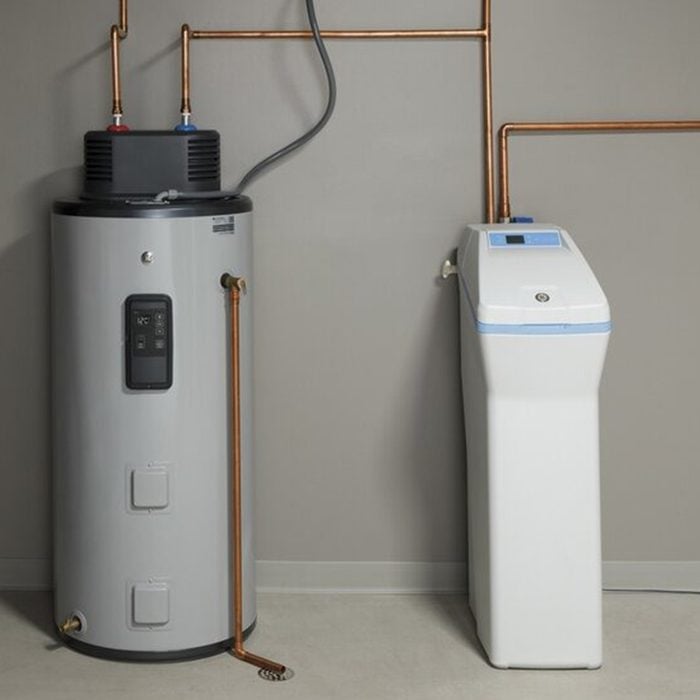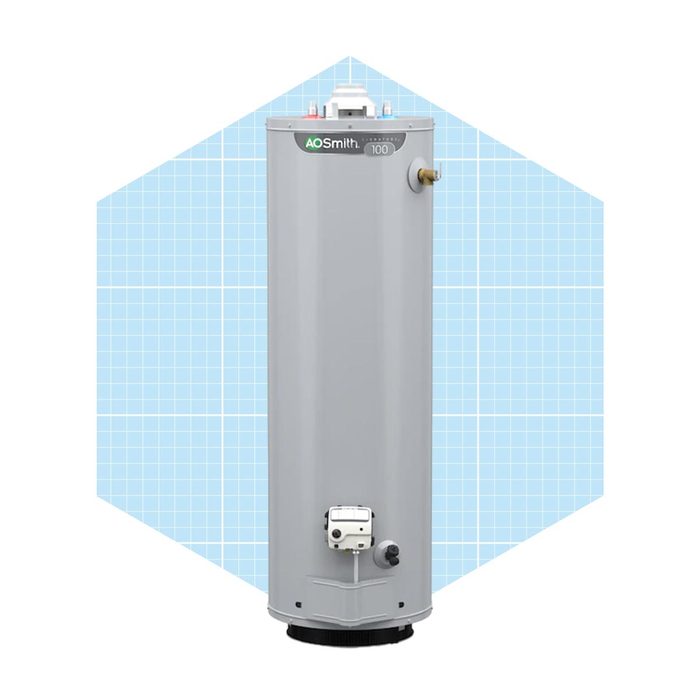 via merchant
via merchant
Best Overall Water Heater
A.O Smith Signature Natural Gas Water Heater
When it comes to traditional gas water heaters, the A.O. Smith’s Signature 100 Series 50-gallon model is a dependable unit at a reasonable price, earning it our top spot for best water heater. You can find less expensive gas units, but this heater’s six-year warranty, self-cleaning dip tube and ceramic-fused tank shield mean fewer potential headaches down the road.
We also like that it’s got an environmentally-friendly burner that produces lower levels of nitrogen oxide and nitrogen dioxide than a traditional gas unit.
Pros
- Affordable
- Highly-rated
- Environmentally-friendly
- Electronic gas valve provides precise temperature control for optimum hot water delivery
Cons
- Tall (but slim) body might not be compact enough for tight spaces
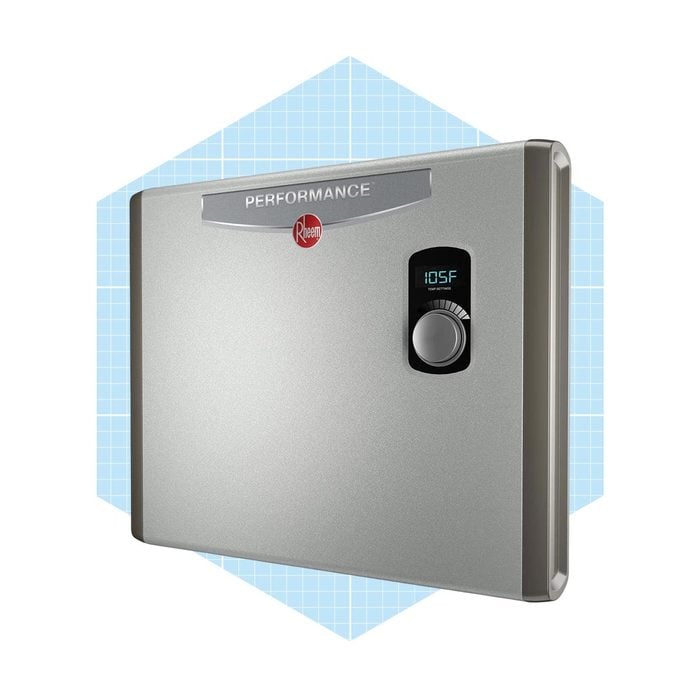 via merchant
via merchant
Best Electric Tankless Water Heater
Rheem Performance Tankless Electric Water Heater
Tankless water heaters only generate heat when you want it. By not keeping a tank of hot water constantly at the ready, you’ll see significant savings in your energy bill.
Units like the Rheem Performance Tankless Electric Water Heater can supply about seven gallons a minute, providing hot water for the whole house. But generating that much heat requires a significant amount of space in the electrical breaker box—you’ll need to dedicate four 40-amp double-pole breakers to this heater.
We love this model because it’s simple to use. The easy-to-read LCD display shows the temperature, and the single dial on the unit’s face allows adjustments in one-degree increments. Plus, the unit comes backed by Rheem’s five-year warranty.
Pros
- Energy-saving electric design heats water only when needed
- Compact
- Easy to install
- Provides instant hot water for up to five showers and two faucets
Cons
- California residents should consider Prop 65 Warnings
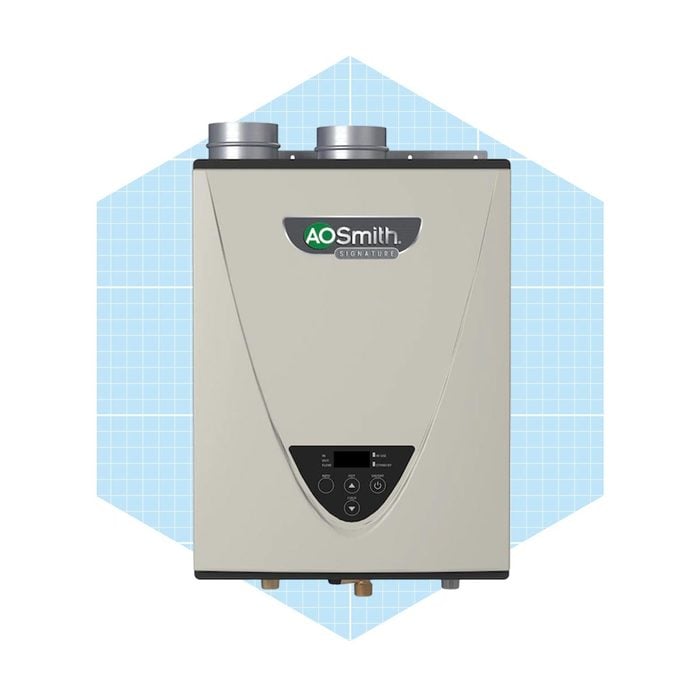 via merchant
via merchant
Best Gas Tankless Water Heater
A.O Smith Signature Tankless Water Heater
The A.O. Smith Signature Series Tankless Water Heater strikes the perfect balance between price and performance. Gas tankless units have a higher initial purchase price than electric versions, but the lower operating costs normally balance out over the life of the unit.
This model provides enough hot water to run three showers simultaneously. Plus it’s Energy Star rated, meaning it’s one of the most energy-efficient units available. Because the unit uses gas for fuel, you’ll need to run a vent line. If you’re planning on DIYing the installation, make sure you comply with all codes and required permitting.
Pros
- Energy-star certified gas model
- Compact
- Easy temperature adjustment
- Copper primary heat exchanger and stainless-steel secondary heat exchanger provide excellent, long-lasting heat transfer
Cons
- Expensive
- Professional installation highly recommended
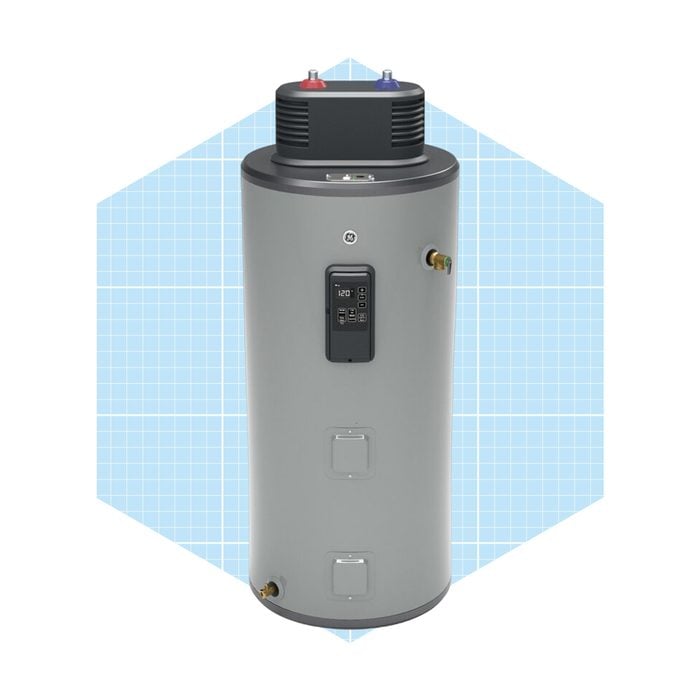
Best Electric Water Heater
GE Electric Storage Tank Water Heater
Hot water heaters may be the last thing on your mind until your current one breaks. But when it does, the GE Electric Storage Tank Water Heater is a worthy upgrade. A 50-gallon real capacity unit, this tank-style electric heater offers a flexible capacity of up to 80 gallons. The flexible capacity setting, when activated, stores your hot water at higher temperatures—this saves money and energy, especially when coupled with the unit’s 2.75″ insulation that reduces lost heat.
With a first-hour delivery rating of 75 gallons, it’s a solid high-efficiency heater that is suitable for larger families of up to six people. WiFi features allow folks to control the temperature of the heater directly from their phones. It’s a perfect pick for those looking to conserve their hot water usage.
Pros
- 50-gallon tank acts as an 80-gallon tank
- Flexible capacity keeps stored water hot
- WiFi connectivity with temperature control
- Rust-proof valves for longevity
Cons
- California residents see Prop 65 Warnings
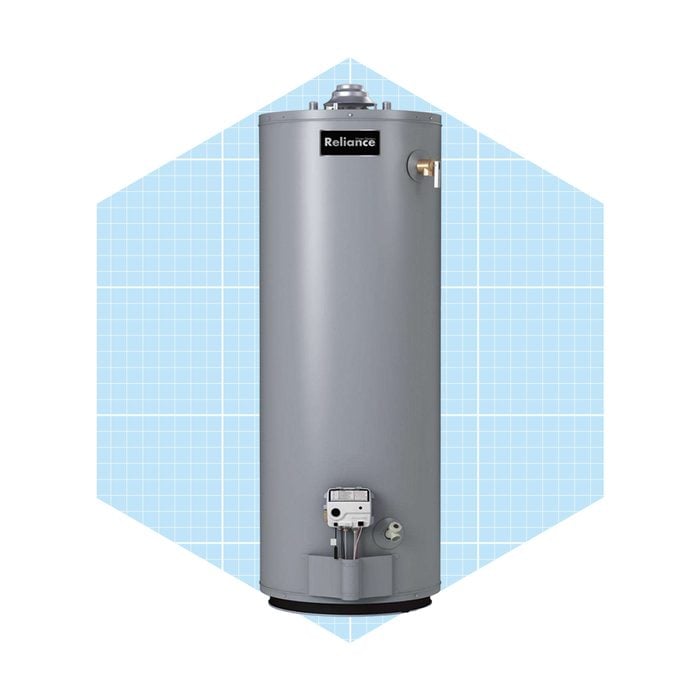 via merchant
via merchant
Best Gas Water Heater
Reliance Natural Gas Water Heater
If your biggest concern is running out of water, you’re better off going tankless to ensure “endless” hot water or buying a pretty large tank. Of these options, the gas tank may actually be the most economical. That’s because medium-sized families regularly drain a water heater tank, so the heater isn’t burning energy to keep an unused tank at temperature. For this reason, medium-sized families typically take longer to recoup the cost of a tankless unit.
If you think a 40-gallon tank is the right fit for you, consider the Reliance Natural Gas Water Heater. An electronic gas control thermostat valve provides precise temperature control. In addition, a blinking LED operational indicator light allows you to see whether it’s running at a glance.
Pros
- Gas thermostat allows for precise temperature control
- 65-gallon first-hour rating gallons
- Glass-lined tank with anode rod protects against corrosion
- Maximum temperature of 155°F
- Large enough for a medium-sized family of four
Cons
- Not suitable for big families, which typically require a 55-gallon tank or larger
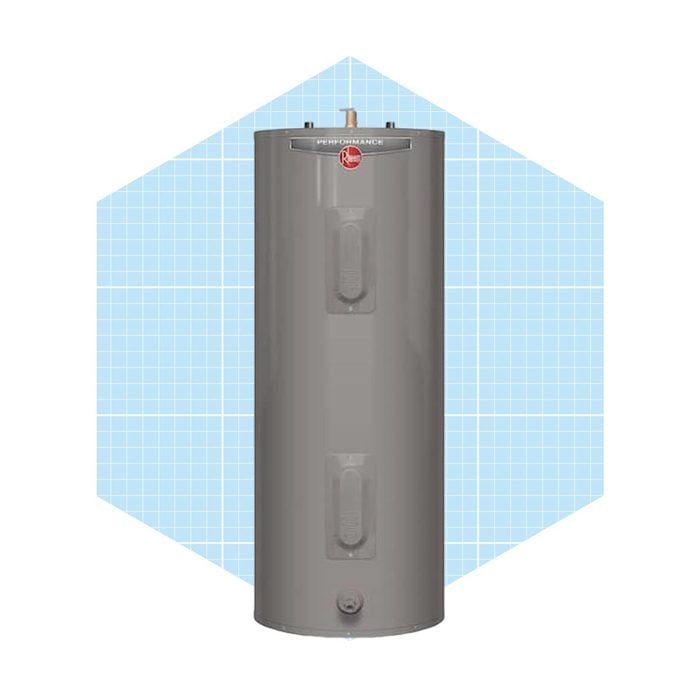 via merchant
via merchant
Best Budget-Friendly Water Heater
GE Electric Storage Tank Water Heater
The GE Electric Storage Tank Water Heater is shockingly wallet-friendly for a high-performance unit. The 30-gallon traditional tank makes it a good fit for smaller families or households with an offset usage cycle since it takes less energy to keep it warm between uses.
It only needs a 30-amp electrical breaker, so it shouldn’t require a massive electrical overhaul to install. If you’re replacing an existing electric unit, it may be tough to find a better bargain than this.
Pros
- Very affordable
- Tank raises efficiency by lowering standby heat loss
- Electric units are easy to maintain
- Delivers 54 gallons of hot water in the first hour
- Adjustable thermostat
Cons
- Only services families of one to three people
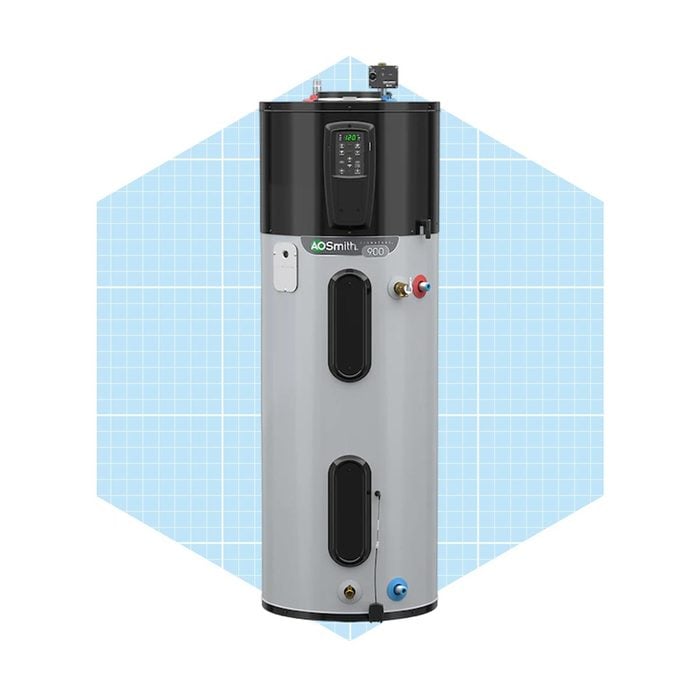 via merchant
via merchant
Best Hybrid Water Heater
A.O Smith Signature Hybrid Water Heater
If environmental friendliness is your primary concern, consider the A.O. Smith Signature 900 Hybrid Water Heater. This Energy Star-certified electric model saves the average home with three to four users hundreds of dollars per year in energy costs, according to the manufacturer.
Its hybrid design features a heat pump, similar to the one you may already have to heat and cool your home, to transfer heat from the surrounding air into the water tank. Because the heat pump is slower than traditional heating, the Signature 900 also features two backup heating elements. It comes with a 10-year limited warranty and may qualify for additional rebates or tax credits.
Pros
- Energy-star certified and four times more efficient
- Hybrid technology
- Reduces water heating costs by up to 76%
- Smart technology allows you to manage your unit from your phone
- Leak-watch technology alerts you when there’s a leak
Cons
- Very expensive
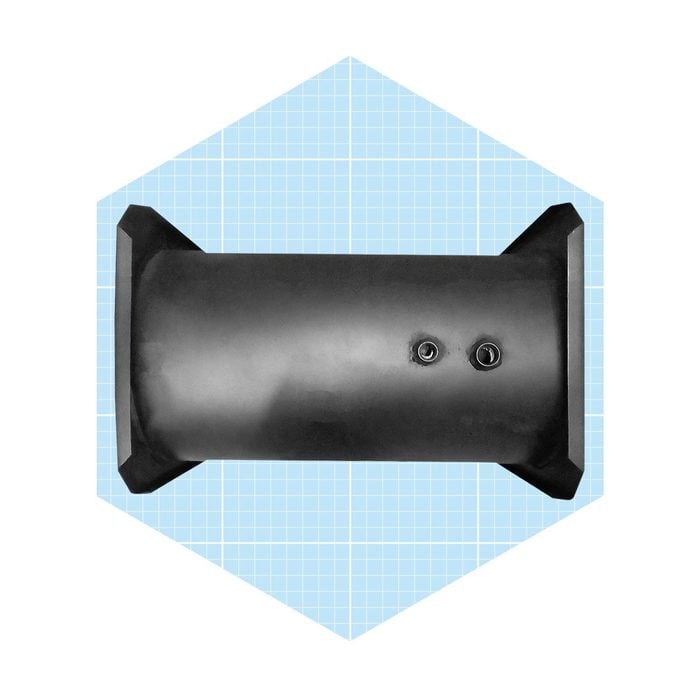 via merchant
via merchant
Best Off-Grid Water Heater
Wood-Fired Water Heater
Sure, some homeowners use a solar array for off-grid living. But if you really want simplicity, consider a wood-fired water heater. This Amish-made unit comes crafted from 3/16-inch welded steel, holds 15 gallons and is efficient enough to continue heating fresh water as it cycles through the tank. It can provide water for back-to-back showers.
We love that it’s not reliant on gas or electricity. But we do need to point out this disclaimer from the manufacturer: “Not UL listed. Not pressure tested. If not properly used or installed, may explode with life-threatening force.” This is a good reminder of why it’s important to be careful when installing any water heater.
Pros
- Efficient wood-fired unit
- Sturdier than similar hot water heaters
- Holds 15 gallons of water
- Amish-made
- Handles log lengths up to 26 inches
Cons
- Pricey
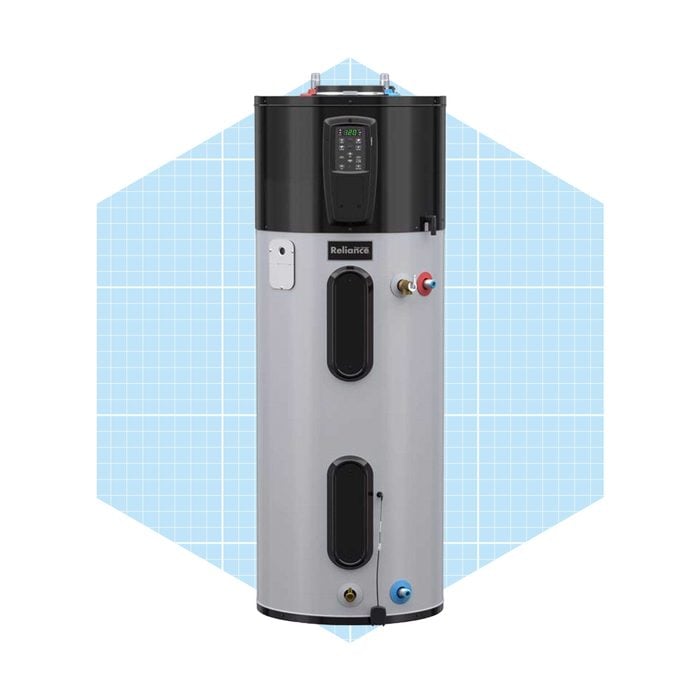 via merchant
via merchant
Best Heat Pump Water Heater
Reliance Electric Water Heater
With several different operation modes—including heat pump, electric and vacation modes—the Reliance electric water heater reduces water heating costs by up to 78%. The heat pump mode utilizes the heat pump for all water heating, making it an energy-efficient operation. Plus, WiFi connectivity notifies and manages the unit from your smartphone, including simplifying temperature control and checking the operational status, thus extending the heater’s life.
An included CSA-certified and ASME-rated temperature and pressure relief valve adds additional safety. As an added bonus, there’s no need to worry about saving energy while on vacation. A vacation mode setting maintains the tank’s temperature at 60°F during vacation or extended absence, for up to 99 days.
Pros
- Hybrid Heat Pump Mode utilizes a compressor as a primary heat source
- Super quiet 45 dBa operation
- 65-gallon first-hour recovery rating
- Services households with more than four people
- Smart anode adapts to local water conditions, protecting against tank corrosion
Cons
- Expensive
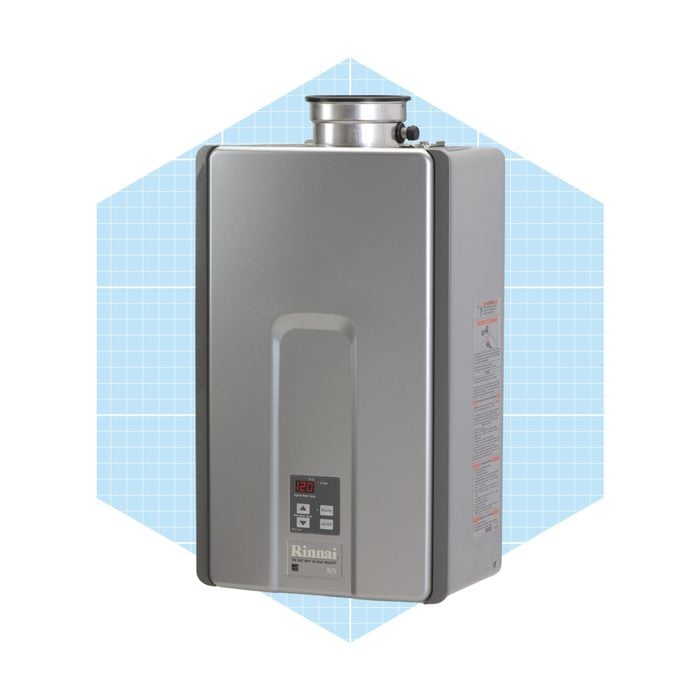 via merchant
via merchant
Best Propane Tankless Water Heater
Rinnai Liquid Propane Tankless Water Heater
There are lots of myths out there about tankless water heaters, but the Rinnai liquid propane tankless water heater blows them all out of—well—the water. This Luxury Series unit uses a space-saving, modern design and incredible efficiency to deliver endless hot water.
A built-in temperature lock function prevents accidental or unauthorized changes to water temperature. It’s also handy for preventing disasters since a leak detection unit shuts off water to the interior units when it detects water on the floor.
Pros
- Energy-efficient design uses propane fuel
- Tankless heater provides 7.5 gallons per minute
- Space-saving design
- Certified for installation in manufactured (mobile) homes
- Complies with South Coast air quality
Cons
- Expensive
- Tankless heaters may take a few minutes to draw hot water to the faucet
Types of Water Heaters
- Tank: These traditional heaters store and heat a large amount of water in a tank so it is ready for use at any time.
- Tankless: Operating without a storage tank, these units heat water on demand, making them energy-efficient.
- Heat pump: By transferring heat from the air or ground, heat pumps are energy-efficient but may be less effective in colder climates.
- Solar: These systems use energy from the sun to heat water. They can be either passive (relying on natural convection) or active (using pumps).
- Point-of-use: Compact and designed for specific locations, these under-the-sink units provide hot water to targeted appliances or fixtures, minimizing energy waste.
- Electric: These easy-to-install picks use electric resistance heating elements. They are commonly used in areas where natural gas is not available.
- Gas: Using natural gas or propane, these heaters are popular for their efficiency and rapid water heating.
What to Consider When Buying a Water Heater
Chisolm notes that some of the key factors to consider when buying a water heater include:
- Price: The full cost includes the purchase price, installation and any additional work such as running vent lines or upgrading your electrical service.
- Fuel source: This is a personal preference. The easiest and most affordable option is almost always to stay with the type of fuel your existing heater uses.
- Capacity: Your needs may be different, but generally a 40-gallon tank provides enough hot water for a home with two occupants, and a 50-gallon tank for four or five people. For six or more, get as large a tank as possible.
- Tankless vs. traditional: Tankless units heat the water as it passes through its coils, creating an endless stream of hot water. The downsides are higher costs and installation expenses. “Tankless products are also a good option if the homeowner is interested in continuous hot water is limited in space,” notes Chisolm.
- Energy efficiency: Higher efficiency units carry a higher initial cost, but the energy savings will usually recoup the investment in a few years. Tankless systems are also more efficient, but their higher cost means a longer “break-even” period.
- Tank construction: Tank heaters can suffer from sediment build-up, making them less energy efficient and shortening their life. You can drain them manually to reduce this risk or look for models with self-cleaning elements and ceramic-lined tanks.
Why You Should Trust Us
I’m an Associate Shopping Editor for Family Handyman with expertise in interior design, home decor, gardening and outdoor trends. Emily Way is an Associate Shopping Editor for Family Handyman with experience researching products and recommending the best designs to consumers. She researched and updated this piece.
For this article, Way sought insights from David Chisolm, who serves as the Vice President of Marketing and Customer Experience at A.O. Smith Water Heating. Chisolm brings a wealth of experience to his role, having previously worked in the new product development department. With 25 years of experience in the manufacturing sector and the home-building industry, he provided valuable expertise.
How We Found the Best Water Heaters
Choosing the right hot water heater is an important decision that impacts the next 10 years of showers you take, so we took this search very seriously. First, we spoke to industry experts to gain insights into the essential features that should guide our selection. Next, we meticulously combed through top-selling heaters at renowned retailers like Lowe’s, Wayfair and Ace Hardware to pinpoint the market’s highest-rated units. Lastly, we read through each product’s specifications, ensuring they meet our stringent standards. Finally, we identified and highlighted the standout features of each unit, allowing you to find the best water heater that will diligently serve your family for years to come.
FAQ
What is the average life of a water heater?
According to Chisolm, the average lifetime of a water heater varies widely based on water quality. “The average lifespan of a traditional water heater is around 14 years,” he says. “If your water heater is approaching this age, one might consider proactively replacing it since there are a range of more energy-efficient, better-performing water heaters on the market now.” To increase the lifespan and efficiency, try installing a water heater timer. It reduces electricity waste and lowers heating costs for most units.
How much should I spend on a water heater?
Quality water heaters range in price from around $500 to $1,500 or more. The cost of a unit will vary depending on whether you decide to go for a tankless or traditional unit. You might also need to budget for a permit to install a unit from your municipality, or pay for professional installation if you don’t want to DIY it. However, the upfront price tag is only part of the total cost breakdown.
“Many homeowners only take into consideration the up-front cost and dismiss the total cost of ownership,” cautions Chisolm. “For example, a standard electric model may cost $600 for the product, but that product costs $600 per year to operate. In contrast, a heat pump water heater may cost $2,000 for the product but only costs $120 in annual cost of operation. The payback would be just under three years in this case—and years four through 14 yield savings of $480 per year. In addition, many utilities and local municipalities have lucrative rebates for high-efficiency water heaters, bringing down this payback period significantly—and often break-even at purchase.”
Do water heaters use a lot of energy?
“Water heaters are the second highest source of energy usage in the home,” notes Chisolm. “On average, they use more energy than a refrigerator, dishwasher, laundry washer and dryer combined.” According to Chisolm, those looking for a more energy-efficient solution should consider a heat pump water heater. “Designed to help drastically reduce energy usage, heat pump technology is the best kept secret in water heating and by far the most efficient way to heat water in the home, regardless of fuel type.”
“To help offset the cost of upgrading to a heat pump water heater, now is a great time to take advantage of the federal tax credit of up to $2,000 under the Inflation Reduction Act,” says Chisolm. “There are also state and local utility incentives, including instant rebates as high as $3,100 in California (TECH Clean California program) and up to $1,000 in other parts of the country,” he adds.

